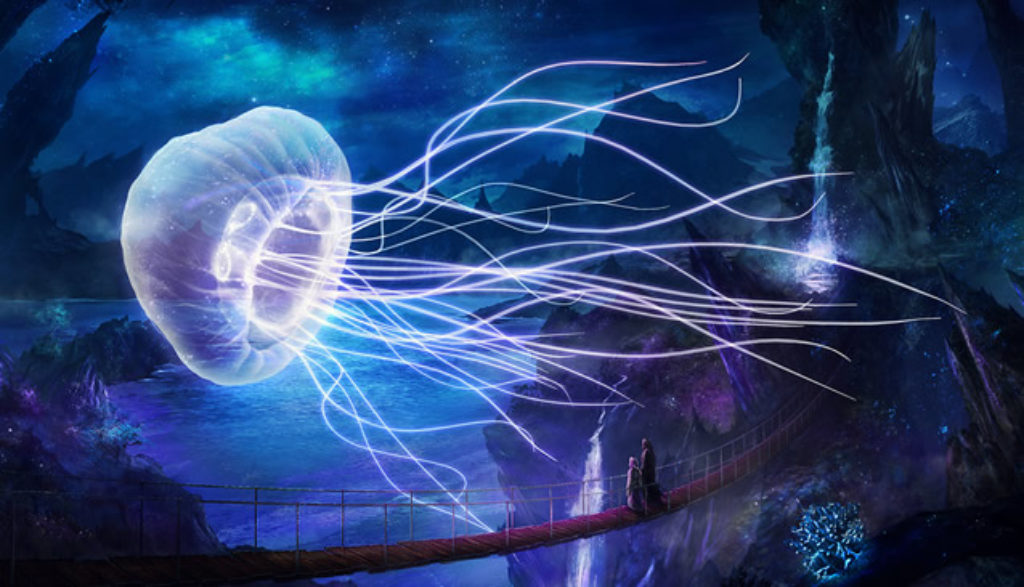
N.E.R.O.: Nothing Ever Remains Obscure is an odd game.
It’s billed as an “interactive visual novel.” Because of that, sometimes you might wonder if you’re really playing a game at all. In some ways it’s similar to another title we reviewed recently called That Dragon, Cancer, a game that focuses less on actual play and more on feeling the emotions of a family’s struggle against that disease.
N.E.R.O. however, approaches its tale of loss and pain very differently.
As N.E.R.O. opens, players wander through a black, night-shrouded world as an unknown character wrapped in a cloak. You land on the dark shores of a small fishing village and find a secret passageway into the heart of a nearby mountain. The shadowy environs are filled with stars, plants and creatures that glow with an almost eerie and surreal phosphorescent light.
At first you’re led to believe that you’re following the adventurous path of a small band of brigands. Along with the neon flora that lights the shadowy path, there are floating walls of illuminated, hand-scratched text telling a swashbuckling tale of what’s come before. It isn’t long in this walk-and-read journey, though, before you realize that this game isn’t really about adventure and swordplay at. Instead, it’s a meandering pilgrimage through a child’s mind.
As players explore an exotic landscape of abandoned villages, thick forests, huge statuary and vast stone edifices, small snippets and details of a real-world story begin to appear in the floating text walls. Small scraps of dialogue between a mom and child grab your attention. Short lines speak of hope, of worry, of despair. And you begin to realize that this is the sad tale of a dad and mom struggling to cope with a mysterious disease that’s plaguing their child … a disease that could possibly lead to a sad end.
This virtual journey is paced however you see fit. Wandering and exploring is encouraged and rewarded with new bits of story detail. To give things a more game-like feel, puzzles are scattered everywhere throughout this environment. The rather simple challenges range from moving mural pieces, to sequencing button pushes, to finding bits of a photograph, to determining the right spot to toss a magical ball of light. Successfully solving each puzzle opens up another slice of insight or further passage in the story’s journey.
If you’re thinking that kind of gameplay sounds intriguing, then you might well be the sort who would enjoy N.E.R.O. This is a slow-paced game that expects players to stop, gaze at the visual splendor and marinate in the story that’s being unlocked ever so slowly. Wandering and ruminating are truly the aims here.
But there is a caveat here, too. And it’s a pretty big one. Even gamers who are inclined to meander through this imaginative world as intended might find the story’s end less than satisfying. Without giving too much away, I’ll say that as the narrative progresses, characters turn from faith and hope in God (after prayers go unanswered) and end up in a pool of great grief (where suicide is a very real issue) from which they cannot extricate themselves. And there’s simply no path back.
We know, of course, that intensely difficult stories play out in the real world every day. But do you really want to wander through a similar tale of grief in a videogame, too? That’s a question players and parents will need to grapple with carefully when it comes to N.E.R.O., a game that’s engaging, often quite beautiful, but not really “fun.” That’s especially true when it comes to the game’s abstract conclusion, one that might be especially difficult for younger players to process.

After spending more than two decades touring, directing, writing and producing for Christian theater and radio (most recently for Adventures in Odyssey, which he still contributes to), Bob joined the Plugged In staff to help us focus more heavily on video games. He is also one of our primary movie reviewers.